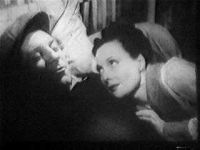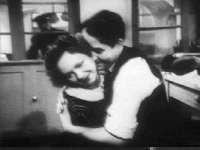


| Instructor: Jeremy Butler Office: 430C Phifer Office hours: TT 3:15-4:45, & by appt. 348-6350 |
|
|
Online grades: http://www.tcf.ua.edu/Classes/Jbutler/T340/F00/grades.htm
|
|
TCF 340 assumes the student understands generally the contours of international cinema history. The course's objective therefore is to investigate in some depth the cinematic work of a particular nation and the historical/theoretical issues pertaining to it. This term our topic will be the French cinema.
Assignments:Film Screenings & Credits:A+ 97-100 C+ 77-79 F 59 and below A 93-96 C 73-76 A- 90-92 C- 70-72 B+ 87-89 D+ 67-69 B 83-86 D 63-66 B- 80-82 D- 60-62
Attendance Policy:Most films will be shown on videotape/DVD Thursdays at 7:00 p.m. in room 216. You may bring guests with you. There will be no other screenings of the films, but Blockbuster Video does carry a few of the titles, and two or three of them are available in the audio-visual section of the Gorgas Library.
Credits are available from the Internet Movie Database. Follow the links below to find credits for specific films.
Course Schedule (subject to changes announced in class):Each student is permitted four absences. Each absence beyond four will result in one point being deducted from the student's final grade (maximum penalty: five points).



| Date | Topic/Film/Discussion | Readings |
| 8/24 | Introduction to Course DAY FOR NIGHT (Truffaut, 1973) |
|
| 8/29 | Film Analysis: Narrative Form | Bordwell/Thompson, chs. 2, 3 |
| 8/31 | Film Analysis: Visual
Style MY OTHER HUSBAND (Lautner, 1983) |
Bordwell/Thompson, chs. 6, 7 |
| 9/5 | Film Analysis: Editing and Sound | Bordwell/Thompson, chs. 8, 9 |
| 9/7 | 11:00 a.m. Analytical Exercise
Due Click here for Exercise illustrations! |
|
|
7:00 p.m. Early French Cinema |
||
| 9/12 | Discussion | Armes, 34-66 |
| 9/14 | The Avant-Garde: Dada & Surrealism UN CHIEN ANDALOU (Buñuel/Dali, 1928) ENTR'ACTE (Clair, 1924) À PROPOS DE NICE (Vigo, 1929) ZERO FOR CONDUCT (Vigo, 1933) |
|
| 9/19 | Discussion | Hughes, 212-255; Bordwell/Thompson, 462-66 |
| 9/21 | French Cinema Between the Wars I: The Popular Front
THE CRIME OF M. LANGE (Renoir, 1935) |
|
| 9/26 | Discussion | Fofi, 172-224 |
| 9/28 | Bazinian Realism: Jean Renoir
THE RULES OF THE GAME (Renoir, 1939) |
|
| 10/3 | Discussion | Bazin ("Evolution"), 24-51 ("Pop. Front"), 36-52 |
| 10/5 | French Cinema Between the Wars II:
Poetic Realism LE JOUR SE LÈVE (Carné, 1939) |
|
| 10/10 | Exam #1 | Bazin ("LJSL"), 5-12 |
| 10/12 | French New Wave I: Alain Resnais HIROSHIMA, MON AMOUR (Resnais, 1959) |
|
| 10/17 | Discussion | Monaco ("Resnais"), 34-52 |
| 10/19 | French New Wave II: François Truffaut THE 400 BLOWS (Truffaut, 1959) |
|
| 10/24 | Discussion | Monaco ("NW"), 13-36, 87-97 |
| 10/26 | French New Wave III: Eric Rohmer CHLOE IN THE AFTERNOON (Rohmer, 1972) |
|
| 10/31 | Exam #2 | Monaco ("NW"), 286-304; Crisp, 67-74 |
| 11/2 | French Modernism: Jean-Luc Godard & Bertolt Brecht BREATHLESS (Godard, 1959) |
|
| 11/7 | Discussion | Brecht, 33-42; Wollen, 79-91; MacCabe, 17-25 |
| 11/9 | Godard and Contemporary Feminism VIVRE SA VIE (Godard, 1962) |
|
| 11/14 | Discussion | MacCabe/Mulvey, 78-104 |
| 11/16 | French Feminism, Continued: Agnès Varda and Claire Denis VAGABOND (Varda, 1986) |
|
| 11/21 | CHOCOLAT (Denis, 1989) (class will run overtime) | |
| 11/23 | Thanksgiving Holiday | |
| 11/28 | Discussion | Kuhn, 129-177 |
| 11/30 | Recent Godard SOFT AND HARD (Godard/Miéville, 1985) |
|
| 12/5 | Discussion | Godard/Miéville, 60-73; Penley, 32-59 |
| 12/7 | Cinema Ascetic: Robert Bresson Bresson, 1-18 A MAN ESCAPED (Bresson, 1956) |
|
| 12/16 | Exam #3 and Take-Home Essay Final Exam Period, Saturday, 8-10:30 a.m. |
Available at local bookstores:
Bordwell, David and Kristin Thompson. Film Art: An Introduction. Sixth Edition. New York: McGraw-Hill, 2000.
Available through the Academic Publishing Service (Supe Store):
In alphabetical order, not the order in which they are assigned. The format used here adheres to the Turabian style for bibliographies--which is different from its footnote style.
Academic Misconduct Policy:Every effort will be made to accommodate students with disabilities. To request disability accommodations, please contact Disabilities Services (348-4285). After initial arrangements are made with Disabilities Services, contact Jeremy Butler.
All acts of dishonesty in any work constitute academic misconduct. The Academic Misconduct Disciplinary Policy will be followed in the event of academic misconduct.